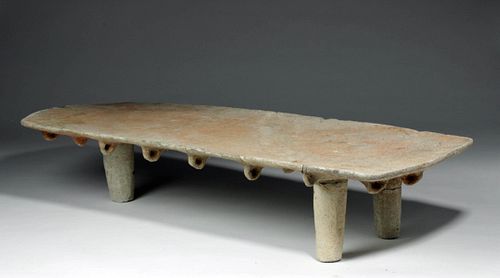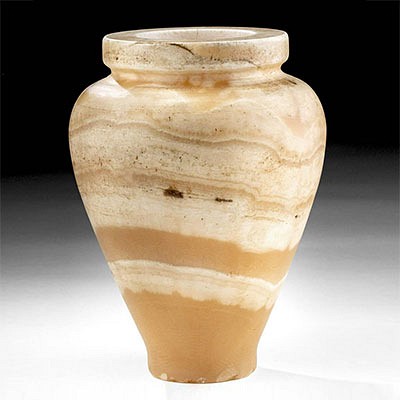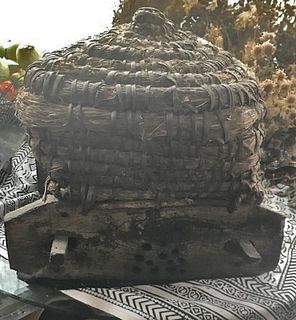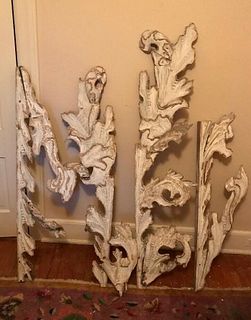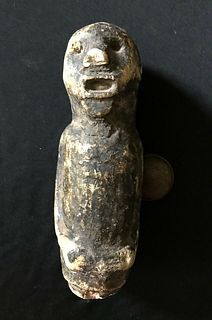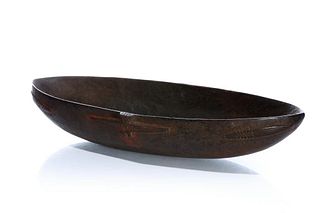Huge / Squatty Costa Rican Stone Metate
Lot 116a
About Seller
Artemis Gallery
686 S Taylor Ave, Ste 106
Louisville, CO 80027
United States
Selling antiquities, ancient and ethnographic art online since 1993, Artemis Gallery specializes in Classical Antiquities (Egyptian, Greek, Roman, Near Eastern), Asian, Pre-Columbian, African / Tribal / Oceanographic art. Our extensive inventory includes pottery, stone, metal, wood, glass and textil...Read more
Estimate:
$3,600 - $5,400
Absentee vs Live bid
Two ways to bid:
- Leave a max absentee bid and the platform will bid on your behalf up to your maximum bid during the live auction.
- Bid live during the auction and your bids will be submitted real-time to the auctioneer.
Bid Increments
| Price | Bid Increment |
|---|---|
| $0 | $25 |
| $300 | $50 |
| $1,000 | $100 |
| $2,000 | $250 |
| $5,000 | $500 |
| $10,000 | $1,000 |
| $20,000 | $2,500 |
| $50,000 | $5,000 |
| $100,000 | $10,000 |
| $200,000 | $20,000 |
About Auction
By Artemis Gallery
Dec 17, 2020
Set Reminder
2020-12-17 10:00:00
2020-12-17 10:00:00
America/New_York
Bidsquare
Bidsquare : VARIETY SALE | Antiquities & Ethnographic Art
https://www.bidsquare.com/auctions/artemis-gallery/variety-sale-antiquities-ethnographic-art-6207
Featuring classical antiquities, ancient and ethnographic art from cultures encompassing the globe. Egyptian, Greek, Roman, Etruscan, Near Eastern, Asian, Pre-Columbian, Native American, African / Tribal, Oceanic, Spanish Colonial, Russian, Fossils, Fine Art, more! Artemis Gallery info@artemisgallery.com
Featuring classical antiquities, ancient and ethnographic art from cultures encompassing the globe. Egyptian, Greek, Roman, Etruscan, Near Eastern, Asian, Pre-Columbian, Native American, African / Tribal, Oceanic, Spanish Colonial, Russian, Fossils, Fine Art, more! Artemis Gallery info@artemisgallery.com
- Lot Description
Pre-Columbian, Costa Rica, Atlantic Watershed region, ca. 1 to 800 CE. An exceedingly large ceremonial metate carved from volcanic stone, with a round-cornered, rectangular table/seat, numerous looped forms attached to the underside of the seat, supported upon three legs. This metate represents one of the most unusual traditions of the ancient Americas. Metates were initially created to grind foods such as corn, certainly a utilitarian purpose; however, they evolved into meaningful ritual objects, replete with strong iconography and intriguing sculptural forms which transformed these objects into much more than a tool. Given the enormous scale and intriguing embellishent of loop attachments to this piece, it was probably intended as a throne of sorts for an elite ruler(s) or to seat a departed lord on his journey to the afterlife. The size and work involved to create this metate suggests a ceremonial function. The looped ornaments may be related to the identity of the owner the piece or the ritual in which the metate was used. Size: 15" L x 37.125" W x 7.5" H (38.1 cm x 94.3 cm x 19 cm)
Provenance: collection of the late Alfred E. Stendahl, Stendahl Gallery, Los Angeles, California, USA, acquired prior to 1990
All items legal to buy/sell under U.S. Statute covering cultural patrimony Code 2600, CHAPTER 14, and are guaranteed to be as described or your money back.
A Certificate of Authenticity will accompany all winning bids.
We ship worldwide and handle all shipping in-house for your convenience.
#126388Seat repaired from several large pieces and areas of loss to peripheries as shown. Legs reattached and in the process cleaned, so some of the original pigment has been removed.Condition
- Shipping Info
-
All shipping is handled in-house for your convenience. Your invoice from Artemis Gallery will include shipping calculation instructions. If in doubt, please inquire BEFORE bidding for estimated shipping costs for individual items.
-
- Buyer's Premium



 EUR
EUR CAD
CAD AUD
AUD GBP
GBP MXN
MXN HKD
HKD CNY
CNY MYR
MYR SEK
SEK SGD
SGD CHF
CHF THB
THB